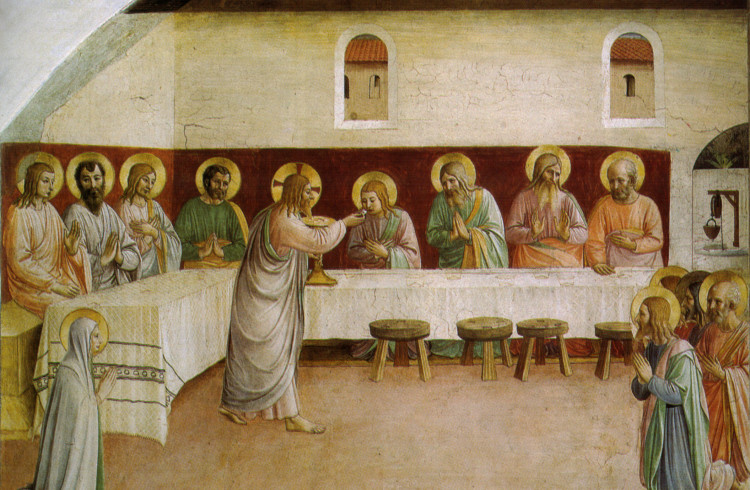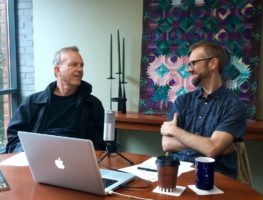God? Vulnerable? Heaven forbid!
But the choices to love freely, to set aside your own rights, to be the first to step toward reconciliation all require excruciating vulnerability. God, in Jesus, has chosen that kind of vulnerability. God, in Jesus, has chosen vulnerability. Click To Tweet
When God’s Heart Broke
This Easter, step into his story through that lens:
God created a beautiful paradise, filled with life and all that was needed to sustain life. Color and fragrance and movement was in everything. There was rich soil and warm sun and seeds and worms. Every bit of life gave birth to more life. All was abundant and flourishing. And in this verdant paradise, he planted himself in the form of human life.
But humans said to God, “This is good! We’d like to keep this life, these bodies, the sun, the rain, the fruit, the beauty. We just don’t want you, if that’s alright with you.”
At which point something in the universe broke. Perhaps it was God’s heart.
As much as it pained him to be separated from his beloved, he honored their choice, let them see what it truly meant to be without him, let them keep the gifts without remembering who gave them.
Reconciled in Time
But he never removed himself entirely. His plan was always to be reconciled in time.
And so, over many generations, he set about his plan of being right with them again.
When two people have fallen into discord, any effort at reconciliation must begin with the one perceived to be in power. And so:
God broke into the world as a human. Although He had equal status with God, Jesus didn’t think so much of himself that he had to cling to the advantages of that status. No, when the time came, he set aside the privileges of deity and took on the status of a slave! Having become human, he stayed human—an incredibly humbling process. We find humanity humbling. How much more so for God! But He didn’t claim special privileges. Instead, he lived a selfless, obedient life and then died a selfless, obedient death—and the worst kind of death at that—the death of a criminal.
Footstools and Washbasins
Although he felt misunderstood, abandoned by his own, rejected, he did not wait for us to return to him. He didn’t wait for us to apologize. Instead he set aside his right to indignation, his right to feel sorry for himself, his right to wrath. Not only did he meet us where we are, he became one of us. And even in choosing the human form he would take, he chose not a king but a servant. Lower than the lowest of us. In doing so, he said “I will not make you a footstool for my feet, (although it would be my right). Instead, I will wash your feet.”
When the character of God lives in a human body, humans, having lived so long away from the presence of God, find it offensive. When the love of God walks among them, humans are so threatened by it, they crucify it. When they see him in human skin, even those who claim to know God best, hate him.
And so, God’s choice to submit himself to become human was also a choice to die. To let himself be killed if that is what humans do when you act like God, when you lay yourself open.
In that moment of his death, there is a clear comparison: the contrast between human beings without God and God in human flesh.
Learning God’s Posture
There are times when two people are in conflict and they both are at fault. But there are other times the conflict is caused by the fault of one—an infidelity that breaks the relationship. For the person who is wronged, it seems too much to ask for them to come and meet halfway. It seems their right to stay exactly where they are, cross their arms and wait for the other to understand them, to apologize to them, to submit to them. But this was not God’s posture, instead he moved towards his beloved who had wronged him. Not only did God set aside his rights and meet us halfway, he kept on coming. Came all the way toward us, to meet us in our hearts and homes. All the way from heaven to earth to make things right. All we have to do is acknowledge him again.
If you’ve ever been in a cycle of argument—as long as both parties believe they are the wronged one, as long as both parties wait for the other to right the wrong, the cycle continues. As long as we both say “I’m the offended one, I can’t move on until you apologize, until you understand me, until you make amends” our relationship will always be broken. Someone has to break that cycle. To mend the unity.
Although God was the one wronged, he is the one who chose to break the cycle. Although he deserves our apology, although he deserves for us to move toward him, he has moved toward us. Although it would be his right to say: “Who do you think you are? Do you know who I am?!” He says “I will become nothing, I will not only become like you, I will become less than you to show how much I want things to be right between us again.”
If you’ve ever been in that place, choosing to be the first to stop the cycle, you want the other to respond well. You’re exposed, and you need to be heard, accepted. When you lay yourself out there, when you submit and show your longing to be reconciled, you’re vulnerable. You want the other to meet you there, to let their own selves also been seen, to tell you they also long to be made right with you. But what if they don’t? What if they laugh in your face, what if they abuse your openness, what if they kick you when you’re exposed?
The Danger of Submission
What if you choose to submit yourself and they’re just not safe?
When God put himself in that place with his beloved humans, we weren’t safe. His whole life was spent with an open heart, telling stories of his longing to be reunited, welcoming the unlovely, creating a space of hospitality. He didn’t just speak words of reconciliation, he embodied it, becoming like us, eating and sleeping and walking and breathing. Not just understanding us in his mind but becoming us in a body. When he let his longing for reconciliation be seen, we rejected him. Not only did we kick him when he was down, we consumed him, in the most inhuman, shameful way.
Jesus: Human Being
Jesus the human being was poor and ordinary. But as he walked the earth, preaching and healing, there was a kind of nobility about him, a respect he gained because of his courage, his wisdom, his following. But as he comes closer to crucifixion, bit by bit, that nobility is stripped from him.
As his followers betray him, he seems more and more like a crazy loner. As he is passed back and forth from Jewish power mongers to Roman power mongers, he becomes like a piece of rotten meat no one wants to deal with. As he is stripped naked and beaten, as he is spat upon, ridiculed. By the time the nails pierce his hands, there is little dignity left. There is a naked, bleeding, strip of broken flesh held up for ravenous eyes to devour.
This is the God who became man and who was consumed by the ones he came to love. This is the God who became man and who was consumed by the ones he came to love. Click To Tweet
This is not the end of the story but it’s important for us to be in this moment of the story.
If it makes us feel bad, that’s okay. Easter Sunday we’ll finish the story. But in our rush to finish the story, we often avoid the pain of it. It’s not just Jesus’ pain. It’s our pain.
The term “coming to the table” means gathering to find understanding. We may see lawyers around a table to reconcile warring spouses or war-lords around a table to reconcile warring nations. But what if the table was not in an office or a war-room but a home? What if it was a feast? Before He died, Jesus set that table and invited us to it. In fact, he became that table of understanding, that feast. He waits for us there.







Missio Alliance Comment Policy
The Missio Alliance Writing Collectives exist as a ministry of writing to resource theological practitioners for mission. From our Leading Voices to our regular Writing Team and those invited to publish with us as Community Voices, we are creating a space for thoughtful engagement of critical issues and questions facing the North American Church in God’s mission. This sort of thoughtful engagement is something that we seek to engender not only in our publishing, but in conversations that unfold as a result in the comment section of our articles.
Unfortunately, because of the relational distance introduced by online communication, “thoughtful engagement” and “comment sections” seldom go hand in hand. At the same time, censorship of comments by those who disagree with points made by authors, whose anger or limited perspective taints their words, or who simply feel the need to express their own opinion on a topic without any meaningful engagement with the article or comment in question can mask an important window into the true state of Christian discourse. As such, Missio Alliance sets forth the following suggestions for those who wish to engage in conversation around our writing:
1. Seek to understand the author’s intent.
If you disagree with something the an author said, consider framing your response as, “I hear you as saying _________. Am I understanding you correctly? If so, here’s why I disagree. _____________.
2. Seek to make your own voice heard.
We deeply desire and value the voice and perspective of our readers. However you may react to an article we publish or a fellow commenter, we encourage you to set forth that reaction is the most constructive way possible. Use your voice and perspective to move conversation forward rather than shut it down.
3. Share your story.
One of our favorite tenants is that “an enemy is someone whose story we haven’t heard.” Very often disagreements and rants are the result of people talking past rather than to one another. Everyone’s perspective is intimately bound up with their own stories – their contexts and experiences. We encourage you to couch your comments in whatever aspect of your own story might help others understand where you are coming from.
In view of those suggestions for shaping conversation on our site and in an effort to curate a hospitable space of open conversation, Missio Alliance may delete comments and/or ban users who show no regard for constructive engagement, especially those whose comments are easily construed as trolling, threatening, or abusive.